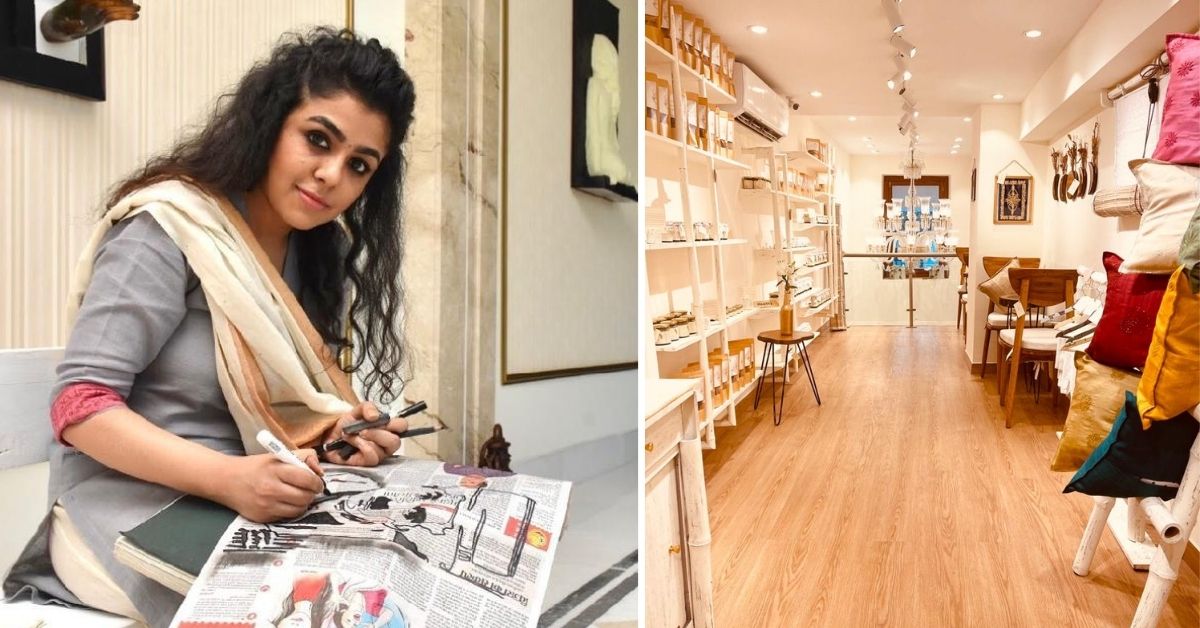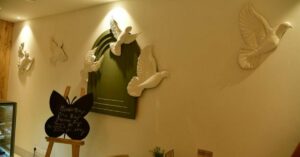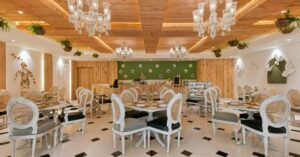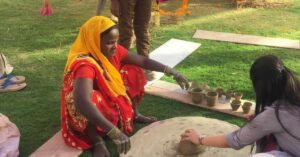How I Built a Plastic & Preservative-Free ‘Farm to Fork’ Cafe that Helps 250 Artisans Earn More
Ankita Jaiswal's 'Brio Art Cafe' in Lucknow is an ode to India's artisan community, fresh food grown on site, and a plastic and preservative free environment that is making waves through art and sustainability.

“People often say craft is meant to be imperfect, but then when it comes to selecting a piece to purchase for their homes, they want something that is perfect,” says Ankita Jaiswal, the owner of Brio Art House and Cafe in Lucknow. In this space, people can get a sense of Indian art as they gorge on delicious snacks.
Having started as a Facebook page in 2011, Brio is today not only empowering artisans but also focusing on sustainability in its ventures.
A slice of art with your chai
The self-taught artist says she has always been drawn to how artisans are integral to the process of creating.
Recounting her own journey, she says she took a directorial course in business and then a short course in sculpting, but the artist in her was always alive. So she started Brio as a page on Facebook in an attempt to express herself and in 2017, she went on to create one of her own art galleries in Lucknow.
Her motive was simple — to incorporate different crafts and art by artisans.
Through the years, the gallery evolved from being a space that showcased only art to becoming one where people could snack on vada pav and sip on some masala chai as they admired the art installations.
To elevate the authenticity of the experience, Ankita also brought in young artists to come in and play Indian musical instruments.
In 2019, the range of foods that were being served grew, new dishes were added, and Brio Art Cafe was born.
From farm to fork
At the cafe, all the ingredients for the dishes are grown on the property itself. A childhood nostalgia served as the inspiration for this.
During her growing up years, Ankita would eat freshly prepared potato chips made by her dadi at home. “I want to bring back this culture at the cafe,” she says.
If you wander around the five-star property in Lucknow’s Kanpur Road in the winters, you will come across rose shrubs in full bloom. It comes as no surprise that the gulkand served at your table is made by fermenting these flowers with sugar.
In summers, guests can guzzle down fresh buttermilk served in kulhad.
“All our dishes and drinks have a careful thought process behind them,” says Ankita. Depending on the season, the menu varies. Choose from a range of healthy delicacies such as vegan pumpkin coconut milk soup, salads brimming with cherry tomatoes, mint, pickled onions, and daals with rice.
Traditional recipes of Lucknow such as the Subz ki Galouti, Daal Sultani are also served.
True to its principle of being all-natural, the cafe follows a ‘no preservative’ policy, and the packed dishes have a shelf life of around 20 days.
You can also purchase homemade gulkand, ramdana laddoos, aachar made here.
Sustainability at your table
The cafe’s pride is its many artisans from Uttar Pradesh. “We are a family,” says Ankita as she explains how her relationship with them goes beyond that of employer and employee.
She educates them about banking and managing their money. During the COVID pandemic, as artisans around the country were affected, the ones at Brio were provided with food and medicines.
We spoke to one of the artisans Shaban who has been working with Ankita, since as long as he can remember. He says, “Since years, I have been crafting pieces. At Brio, there is always something new to learn every day which gives me the assurance that the craft will continue to remain alive. It also gives my children a chance to get a good education and lets me bring bread home every night.”
The cafe is extremely conscious when it comes to the materials that are being used for operations. Plastic is a big no and it is replaced by the more eco-friendly kulhad that is made by rural women from in and around Lucknow.
The waste from one process finds itself as the main material for another at Brio.
Wooden boxes that aren’t being used anymore, along with waste wood are converted into trays and furniture. In this way, Ankita says they also support women who are artisans by giving them a chance to earn.
Bone china is replaced by ceramic dishes and boxes are repurposed for courier packaging instead of using plastic for the same. Baskets made from dried mulberry branches showcase Ankita’s love for using freely available materials as decor in the cafe.
“It has been an organic journey coupled with a love for nature and supporting these fellow artisans,” says Ankita, adding that the cafe works with around 250 artisans currently.
This number is exponentially increasing.
How?
Whenever Ankita comes across a new craft in a region of India, she gets more artisans on board for the purpose of bringing it into the cafe. This includes glasswork by artisans from Firozabad, brass crafting by artisans from Moradabad, marble stonework by artisans from Agra, etc.
Ask her about the challenges that have dotted her journey as an entrepreneur, and she says there are many.
“It has not been easy creating a plastic-free space,” she says, adding that people often tend to focus more on the packaging than the craft.
“I create pieces at Brio that are sustainable and environmentally friendly,” she says. “The art pieces that we create will last you as long as you take care of it,” she adds.
While, on the one hand, she tries to get people to comprehend the importance of supporting local art, on the other hand, is the challenge of getting craftsmen to turn her ideas into crafts. “A craftsman breaks three glasses to create a certain piece,” she says, explaining that while local craft does seem pretty, there is a lot of trial and error involved.
The venture is self-funded, and Ankita says they receive approximately ‘100 orders per month’, adding that the number is steadily growing.
As you browse through their collection online, you will see arts and crafts that have a special touch, and ones that are unique as their patterns set them apart.
You can check out their collection of handmade paper bags, handpainted wall plates, neem bark napkin holders and more here.
“When you see the pictures of the art pieces, you’ll notice that we click them ourselves,” says Ankita explaining that they wish for their customers to have a clear picture of what they will be delivered and hence do not see the point in putting out images that may be deceiving.
“Our pictures might not be perfect. But our craft definitely is.”
(Edited by Vinayak Hegde)
This story made me
- 97
- 121
- 89
- 167
Tell Us More
We bring stories straight from the heart of India, to inspire millions and create a wave of impact. Our positive movement is growing bigger everyday, and we would love for you to join it.
Please contribute whatever you can, every little penny helps our team in bringing you more stories that support dreams and spread hope.



















